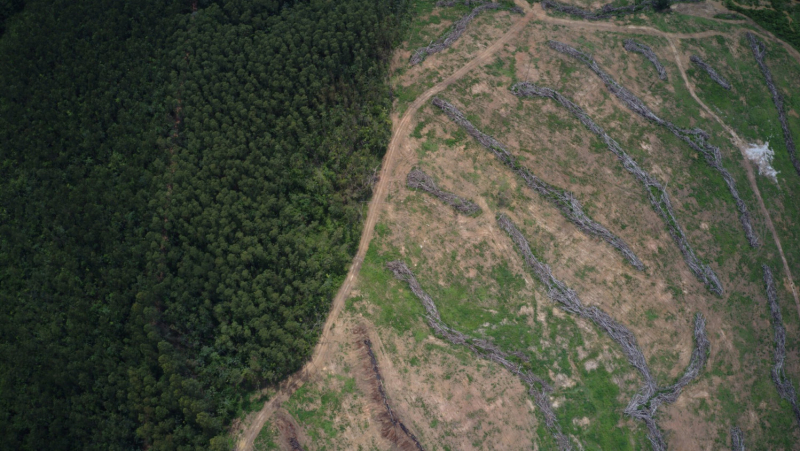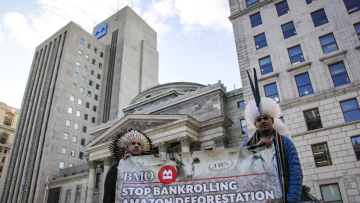Global Witness calls on financiers to stop bankrolling rainforest beef, after official audit reflects findings about JBS

We've written to the financiers of the world’s biggest meat producer, JBS, urging them to suspend their dealings with the company until it eliminates deforestation, land grabs and other significant irregularities from its supply chains in the Amazon.
The letter was sent to investors after an official audit by Brazilian prosecutors in the Amazon state of Pará corroborated large-scale illegal deforestation identified in Global Witness’ own reports.
From mid-2019 to mid-2020, more than one in six cows – almost 94,000 head of cattle – of JBS’s audited purchases were not compliant with their legal obligations, mostly due to deforestation caused by their direct suppliers, according to the official audit. (1)
While JBS is not the only beef company working in this part of the Amazon, it was responsible for nearly 69% of the ‘irregular’ cattle purchases made by over a dozen companies audited in Pará.
The financiers we contacted – who are all members of the vaunted Glasgow Financial Alliance for Net Zero (GFANZ) – retain over US$170 million of shares in JBS (2), whilst Barclays has underwritten bond deals for the company worth US$2.75 billion since 2017.
Global Witness investigations have supported prosecutors on the ground in the Amazon state of Pará
JBS’s internal audits for the period play down this picture, but this marks the second time that our investigations and research have been able to support official prosecutors in Pará.
Global Witness began independently auditing JBS’s cattle purchases in 2019, when it became clear their claims did not match up with what was happening on the ground. In 2020, our report Beef, Banks and the Brazilian Amazon revealed that between 2017 and 2019, JBS bought cattle from 327 ranches in Pará containing over 20,000 football fields-worth of illegal deforestation.
After sharing our findings with prosecutors in Pará, they carried out an official audit of JBS’s cattle purchases between 2018 and mid-2019, confirming the audit findings of our report.
Officials found that around a third of the company’s audited purchases were not compliant with its legal obligations. JBS was, by a considerable measure, the worst performing of the audited firms, in absolute terms.
As a result of these failures, prosecutors took the unprecedented step of fining JBS almost US$1 million. A new agreement was then signed obliging JBS to adopt more stringent controls when checking for non-compliant ranches, mirroring recommendations made in Global Witness’ report.
A year later, in 2020, we found that JBS continued purchasing from 144 of these same ranches, once again to failing comply with its legal obligations. JBS denied our claims, but we, in turn, demonstrated why their explanations were not justified. Again, we sent this to local prosecutors, and this fed into their official findings.
More recently, JBS wrote to us to say they have blocked 154 ranches from their list of suppliers based on the methodology we used in our Beef, Banks and Brazilian Amazon report. Parts of this method have been integrated into an updated version of the official protocol prosecutors used to monitor cattle supply chains, thanks to the dedication of many civil society groups.
JBS will face our scrutiny in other states
So far, we have focused our efforts on Pará, where local prosecutors publish their own audits due to legal “no deforestation agreements”. However, JBS is active across multiple states in the Amazon.
If JBS is performing poorly where it is being independently scrutinised, what kind of deforestation might it be responsible for elsewhere?
To answer this question, we have begun new cattle purchase audits in the state of Mato Grosso, which has been hard-hit by deforestation in recent years. It straddles the Amazon rainforest and nearby Cerrado, a tropical savannah and biodiversity hotspot – both of which are under threat from cattle and soyexpansion.
What investors must do now
Given their continued exposure to the proceeds of illegal deforestation, Global Witness is calling on financiers and importers linked to JBS to:
- Suspend any services, financing or contracts with JBS, or products sourced from JBS, until it can be transparently shown the company is complying fully with its no deforestation agreements
- Ensure that they provide remedy and redress for affected communities and ecosystems, where their services or relationship with JBS have caused, contributed to, or are directly linked to deforestation and human rights abuses
- Adopt a zero-tolerance policy for threats and attacks on environmental and human rights defenders
- Call for Brazilian state authorities to ensure that publicly available and independent data that tracks the lifecycle of cattle, such as cattle transport permits, are easily accessible.
In total, Global Witness wrote to HSBC, Deutsche Bank, Credit Suisse, BNP Paribas, Blackrock, JP Morgan, Morgan Stanley, Aviva and Robeco - who are all JBS shareholders - and Barclays, who are underwriters for company’s bonds, asking them to respond to the audit results. You can read their responses in full.
We warned them to follow the recommendations above and not to rely on JBS’s own reports because:
A company repeatedly exposed for its links to deforestation, which it persistently denies, despite its legal obligations, cannot be trusted to tell you the whole picture of its performance.
Aviva said it now considers JBS a ‘red rated issuer’, which prevents any further active investment in the company, although it retains some passive exposure to JBS through index funds. The pension fund recently completed a review of its portfolio and now routinely votes against company directors making insufficient progress on deforestation.
Robeco replied that it uses its shareholder position to push for positive change and considered JBS to have improved traceability and monitoring in 2021, though it acknowledged: “We believe the findings by the Federal Prosecution Office in Pará reconfirm the previously known gaps in the company’s environmental and social due diligence processes, as well as highlight the clear litigation risks posed to companies for both past and continued negligence towards deforestation within their sourcing.”
Veronica Oakeshott, Head of Global Witness Forest Team, said: “These banks – with their big corporate responsibility teams and adverts touting their green credentials – now know that the company they are backing is the subject of massive deforestation-related fines, damaging official audit results and exposés from Global Witness and others. Aviva has red flagged JBS and pulled out of its active investment in the company, but other financiers need to follow suit. Big banks like Barclays, JP Morgan and BNP Paribas must stop financing companies producing Rainforest beef.”
This year, Global Witness will continue to support local prosecutors in Brazil through our investigations into JBS’s supply chain and how its financiers profit from deforestation of the Amazon and other critical biomes.
Notes for editors:
(1) As part of their legal obligations JBS must ensure their supply chain is free of deforestation, overlapping with indigenous land, slave labour as well as other criteria.
(2) According to their latest shareholder filings accessed through Thomson Reuters’ analytic tool Refinitiv Eikon, accessed 13 February 2023.

